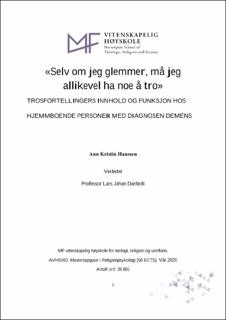«Selv om jeg glemmer, må jeg allikevel ha noe å tro» : trosfortellingers innhold og funksjon hos hjemm[e]boende personer med diagnosen demens
Master thesis
Permanent lenke
https://hdl.handle.net/11250/2677233Utgivelsesdato
2020Metadata
Vis full innførselSamlinger
Sammendrag
Background and Aims: The majority of people who experience dementia are living at home. The aim of this study is to explore the narratives of faith, and to describe and understand the impact these particular narratives have upon a person's religiosity and spirituality, with regard to people who suffer from dementia, are living at home and have assistance from home-care services. Will religiosity and spirituality decline because of dementia? This was investigated from a psychology of religion approach, and the question was asked: in which ways do narratives of faith have a significant function for people with dementia, who are living at home.
Methods: A descriptive qualitative approach was used. Data was collected through non-structured interviews with six persons, all who were diagnosed with dementia. Data was analysed using systematic text condensation.
Results: Five categories and some subcategories emerged from the analytical process:
1) existential experiences, development and identity 2) Relationships and community
3) religious faith, experiences and praxis 4) Emotion 5) Experiences of loss and crisis.
Discussion: The five categories described were discussed related to three central subjects in psychology of religion: 1) view of life 2) meaning-making 3) relationships with others. The participants’ subjective experiences of their faith narratives, including rituals, embodiment and place, as resilient factors were discussed.
Conclusion: Narratives of faith were important parts of the life stories of the participants in this study. This gives way for the suggestion that religiosity and spirituality not necessarily decline with the progression of dementia, but is interwoven in the individuals’ life stories. This would have been of great interest to investigate in another research design. However, the present study points at the importance of assisting persons with dementia in home care in expressing and making meaning of their faith narratives.
